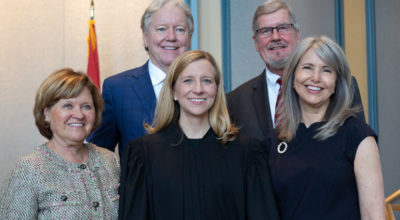

Chief justice Roger Page of the Tennesee supreme court must recuse himself and not consider my petition for a hearing in the supreme court on account of being involved in the thing complained of in the suit. He has a bias against me, the relator in State ex rel. Tulis v. Lee, because he had me arrested for covering the secretive judicial conference. My motion for recusal and disqualification, filed this week in the Knoxville office of the court, demands four of the five justices recuse.
Facts regarding justice’s activities
- Arrest of relator as member of the press
Chief Justice Page on Nov. 6, 2021, oversees the fraudulent unlawful arrest of relator, a press reporter covering the Tennessee judicial conference in Franklin, aiding and abetting through omission the abuse to an unlawful prosecution of relator, whereupon the Williamson County general sessions judge M.T. Taylor dismisses the criminal trespass charge Dec. 14, 2021, as lacking probable cause. The case is expunged.
2 . Signing fraudulent orders
Justice Page’s signature is on Order suspending in-person court proceedings, No. ADM2020-00428, filed March 13, 2020, based on a facially fraudulent emergency order of respondent Lee, the subject matter of the petition and proceedings justice requires review of presently, or without independently demonstrating a nonfraudulent exigency supporting the judicial branch order. In it, “the Chief Justice of the Tennessee Supreme Court hereby declares a state of emergency for the Judicial Branch of Tennessee government and activates the following Continuity of Operations Plan for the courts of Tennessee.” The order follows the facially fraudulent executive order No. 14, from respondent Lee on March 12, 2020, declaring a state of emergency while fraudulently and wickedly disobeying, breaching the controlling infectious disease statute of the legislative branch, at T.C.A. § 68-5-104 that requires demonstrating a nonfraudulent exigency. The chief justice approves of denials of petitions of maladministration of justice in an extraordinary emergency case seeking judicial, administrative, managerial and employer authority exercise to stop trial court illegal acts and abuses, which cover up these official misconducts, not acting independent from them, which certiorari denial to cure is sealed away by mandate to which relator filed timely objection to preserve that evidence here.
The state, on relation, is denied justice, covering with these judicial orders complicit with the respondents-in-fraud acts and omissions, notwithstanding the requirement of judicial independence, or the constitutional common law reservation of original jurisdiction to the court of last resort in these unique and extraordinary matters, without remedy, to do justice and despite all court officers agreeing of record that there is no adequate remedy despite every equity principle to the contrary, or that mandamus is the only remedy in effect by their own deceptive word in the court of last resort.
3. Office of trust
Justice Page is a member of Tennessee code commission. The commission is established at T.C.A. § 1-1-101. The law names the chief justice as chairman § 1-1-102. The constitution at art. 6, sect. 7, says judges “shall not be allowed any fees or perquisites of office nor hold any other office of trust or profit under this state or the United States.” Justice Page is employed by state of Tennessee as chief justice, in an office of trust. He is named by a statute to a second office of trust that he fills without objection. He is silent as to this apparent constitutional violation in a second office of trust.
Arguments regarding Justice Page
THEREFORE, Justice Page has three grounds on which to recuse himself.
1. Arrest of relator. Justice Page should recuse himself because he has a personal relationship with relator that may create a bias or prejudice in his mind, inclining him to vote one way or another or to influence others in relator’s regard. It is now judicially confirmed in dismissal, Justice Page will not defend the innocent nor protect their rights. The criminal trespass case against relator, and relator’s rights to redress the harm civilly or criminally, touch on a gain or loss to his person and position, and make this case one in which the chief justice is “interested.” No observer or neutral outsider could believe that Justice Page is able to give a just and fair ruling after he partially, incompetently, and without due diligence arranges to violate the law Nov. 6, 2021, through agents and oppress a reporter doing his job by right under federal and state constitutions and under the open meetings act, his right to do so settled as a matter of law. The breach tells relator the honorable justice will not uphold and apply the law at issue in this case, defending T.C.A. § 68-5-104, and the procedural due process protections in law and rule that relator has every right to claim as his property and equity in this action to uphold the rule of law. The interest Justice Page has in his abusive relationship with relator would be an impropriety to overlook. It would also give the appearance of impropriety, and would not promote public confidence in the independence, integrity, and impartiality of the courts. Rule 2.1 says “personal bias or prejudice concerning a party” are ground for recusal. A prejudice necessary to require recusal is —
[T]he attitude of personal enmity towards the party or in favor of the adverse party to the other’s detriment. It is not the mere possession of views regarding the law or the conduct of a party or of his counsel. Prejudice is in the personal sense rather than in the judicial sense. Prejudice refers to a mental attitude or a disposition of the judge towards a party: either a hostile feeling or spirit of ill-will against one of the litigants, or a favoritism toward one of them.
Alley, Id., at 821 (Tenn. Crim. App. 1994), citing State ex rel. Wesolich v. Goeke, 794 S.W.2d 692, 697 (Mo.App.1990)
2. Signing fraudulent orders and knowledge of facts outside of case. Chief Justice Page is in league with respondents in fraud in the state of emergency lacking a nonfraudulent exigency. Confirmation of the alliance is evidenced in his denying without stated reason repeated efforts to lift the unlawfully trapped case out of the lower court into the supreme court for review, or to order correctives upon the trial court over case management.
The interest that relates to his personal and professional stature is touched personally by relator, who accuses him of grave prejudices before the court, and in his arrest, as well federal the deprivation of rights by a state official under color of state law. Judicial prejudice as to the substance and merits of his claim that are possibly a source of grave personal offense caused to relator. Relator’s claims go to the quick of Justice Page, to the center of the man, the person who is the judge, the “mental attitude or *** disposition.” The injury of these allegations makes it more than likely that Justice Page will be unable to avoid prejudice and bias in hearing his petition. Indignation and frustration at relator deny the justice a neutral mind, open to both sides of the case. That would be a due process violation against state of Tennessee, on relation.
Even where the court has authority to make rules, neither fraud nor case law extend to the court the communicable disease due process that the general assembly vests in an agency of the county or the governor’s health department in Nashville requiring both or either to demonstrate a nonfraudulent communicable disease determination for an infectious agent. All the “broad conference of full, plenary and discretionary power,” T.C.A. § 16-3-504, and all the case law in the world cannot invent a judicial power the general assembly has expressly vested in an executive agency requiring it to demonstrate the nonfraudulent communicable disease determination for an infectious agent; fraud or branch breach do not meet that demonstration determination requirement.
3. Office of trust in breach of constitution. The constitution at art. 6, sect. 7, says judges “shall not be allowed any fees or perquisites of office nor hold any other office of trust or profit under this state or the United States.” Chief Justice Page holds a second office of trust in contravention of the constitution, in determining that statute is superior to the constitution, that a command at T.C.A. § 1-1-102 supersedes a prohibition of that act in the constitution. That he swore an oath of office before God as his witness to uphold the constitution, then agrees to violate its terms in furthering his judicial and legal career on the Tennessee judicial commission, strongly suggests he cannot be trusted in handling this case that enforces constitutional and police power common law requirements upon two holders of office who, like the chief justice, claim exemption from law.

